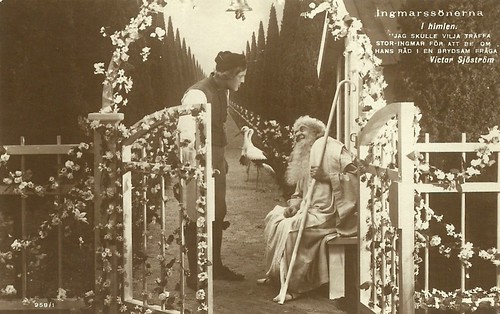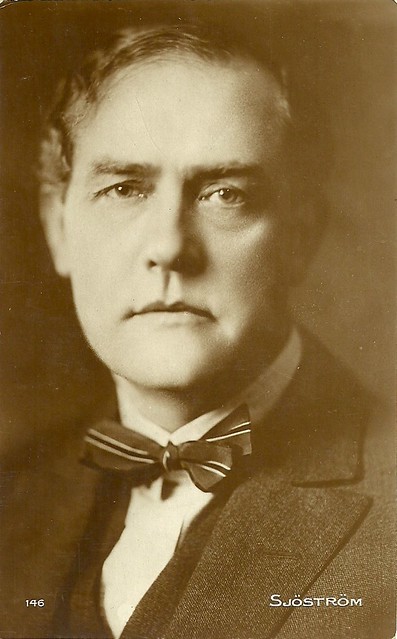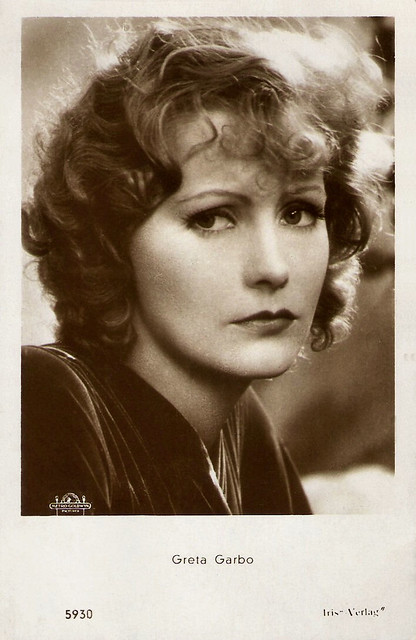Victor Sjöström (1879-1960) was one of the most important Swedish film actors and directors, famous for his poetic and touching narratives, such as Ingeborg Holm (1913), Terje Vigen/A Man There Was (1916) - by then the most expensive Swedish film made - and Körkarlen/The Phantom Carriage (1920), considered as one of the best Swedish silent films. From 1923 he worked in Hollywood under the name of Victor Seastrom, directing such films as He Who Gets Slapped (1924), featuring Lon Chaney, and The Wind (1928), starring Lilian Gish. He returned to Sweden at the advent of sound cinema, and continued working there. Memorable is his last acting part in Smultronstället/Wild Strawberries (1957) by Ingmar Bergman.

Swedish postcard. Victor Sjöström in Ingmarssönerna/Sons of Ingmar (Victor Sjöström, 1919), based on Selma Lagerlöf's novel. Young Ingmar at Heaven's Gate. The caption translates: "I would like to meet Old Ingmar to ask for his advice in an awkward matter."
Victor David Sjöström was born in Silbodal, in the Värmland region of Sweden, in 1879. He was only a year old when his father, business man Olof Adolf Sjöström, moved the family to Brooklyn, New York in 1880.
As a boy, Sjöström was close to his mother, actress Sofia Elisabeth Hartman, who died in New Tork during childbirth in 1886. Victor was seven years old then. Sjöström returned to Sweden where he lived with relatives in Stockholm. His uncle was a leading actor at the Royal Dramatic Theatre in Stockholm during the latter part of the 19th century: Victor Hartman.
The teen-aged Sjöström loved the theatre, but after his education, he turned to business, becoming a donuts salesman. Fortunately for the future of Swedish cinema, he was a flop as a salesman, and turned to the theatre, becoming an actor and then director.
The Swedish film production company Svenska Bio hired him and fellow stage director Mauritz Stiller to helm motion pictures. His debut was the silent film Ett hemligt giftermål/A Ruined Life (Victor Sjöström, 1912) with Hilda Borgström and John Ekman.
That year, he also made the silent drama Trädgårdsmästaren/The Gardener (Victor Sjöström, 1912), the first film to ever be banned by the Swedish censor system. Sjöström himself played a brutal gardener who rapes a young, innocent woman (Lili Beck) in his employ in a lovely greenhouse. In the final scene, the girl is found dead the next morning on the floor of the greenhouse, with red roses around her. The official comments of the censors were: "A breach of respectability. The association of death and beauty poses a threat to public order." The film was long thought to have been lost, but in 1979 a copy was found in an archive in the United States.
Between 1912 and 1915, Victor Sjöström directed 31 films of which only three still survive. In 1913, he directed Ingeborg Holm (1913), which is considered the first classic of Swedish cinema. His films of the 1910's are marked by subtle character portrayal, fine storytelling and evocative settings in which the Swedish landscape often plays a key psychological role. The naturalistic quality of his films was enhanced by his (then revolutionary) preference for on-location filming, especially in rural and village settings.
Sjöström's other surviving films include Ingmarssönerna/Sons of Ingmar (Victor Sjöström, 1919), the sequel Karin Ingmarsdotter/Karin, Daughter of Ingmar (Victor Sjöström, 1920) and Körkarlen/The Phantom Carriage (Victor Sjöström, 1921), all based on stories by the Nobel-prize winning novelist Selma Lagerlöf.
Released on New Year's Day 1921, Körkarlen/The Phantom Carriage starred Victor Sjöström himself, alongside Hilda Borgström, Tore Svennberg and Astrid Holm. The film is notable for its special effects, its advanced (for the time) narrative structure with flashbacks within flashbacks, and for having been a major influence on Ingmar Bergman.

French postcard by Editions Cinémagazine, no. 146.

Greta Garbo. Austrian postcard by Iris-Verlag, no. 5930. Photo: Metro-Goldwyn-Mayer.
In the 1920s, Victor Sjöström accepted an offer from the Goldwyn Studio to work in the United States. In Sweden, he had acted in his own films as well as in those for others but in Hollywood, he devoted himself solely to directing. Using an anglicised name, Victor Seastrom, he made Name the Man (1924), a dramatic film based on the Hall Caine novel.
His first M.G.M. production was the melodrama He Who Gets Slapped (Victor Seastrom, 1924) starring Lon Chaney and Norma Shearer. It was not only a critical success but a huge hit, getting the new studio off onto a sound footing. According to Jon C. Hopwood at IMDb: "He was highly respected by studio boss Louis B. Mayer and by production head Irving Thalberg, who shared Sjöström's concerns with art that did not exclude profit."
Sjöström went on to direct great stars of the day such as Lillian Gish in The Scarlet Letter (Victor Seastrom, 1926) and The Wind (Victor Seastrom, 1928), Greta Garbo in The Divine Woman (Victor Seastrom, 1928), and John Gilbert in The Masks of the Devil (Victor Seastrom, 1928) .
He finished his Hollywood career after his first talkie, A Lady to Love (Victor Seastrom, 1930), starring Vilma Bánky and Edward G. Robinson.
Uncomfortable with the modifications needed to direct talking films, Victor Sjöström returned to Sweden where he directed two more films, a Swedish and a German version of the drama Markurells i Wadköping/Väter und Söhne/Father and Son (Victor Sjöström, 1931).
His final directing effort was an English language drama filmed in the United Kingdom, the swashbuckler Under the Red Robe (Victor Seastrom, 1937), starring Conrad Veidt and Annabella.
Over the following fifteen years, Sjöström returned to acting in the theatre, performed a variety of leading roles in more than a dozen films and worked as director of the Svensk Film Industri company.
At age 78 he gave his final acting performance, probably his best remembered, as the elderly professor in Ingmar Bergman's film Smultronstället/Wild Strawberries (1957), for which he won the National Board of Review's Best Actor Award.
In 1960, Victor Sjöström died in Stockholm at the age of eighty and was interred there in the Norra begravningsplatsen.
He married three times, to Alexandra Stjagoff (1900–1912), actress Lili Beck (1913–1916) and actress Edith Erastoff (1922–1945). He and Erastoff had two daughters: actress Guje Lagerwall (1918) and Caje Bjerke (1918).
Trädgårdsmästaren/The Gardener (Victor Sjöström, 1912). Source: forgottenmovie (YouTube).
Körkarlen/The Phantom Carriage (Victor Sjöström, 1921). Source: William Thomas Sherman (YouTube).
Sources: Jon C. Hopwood (IMDb), Wikipedia and IMDb.

Swedish postcard. Victor Sjöström in Ingmarssönerna/Sons of Ingmar (Victor Sjöström, 1919), based on Selma Lagerlöf's novel. Young Ingmar at Heaven's Gate. The caption translates: "I would like to meet Old Ingmar to ask for his advice in an awkward matter."
A Breach of Respectability
Victor David Sjöström was born in Silbodal, in the Värmland region of Sweden, in 1879. He was only a year old when his father, business man Olof Adolf Sjöström, moved the family to Brooklyn, New York in 1880.
As a boy, Sjöström was close to his mother, actress Sofia Elisabeth Hartman, who died in New Tork during childbirth in 1886. Victor was seven years old then. Sjöström returned to Sweden where he lived with relatives in Stockholm. His uncle was a leading actor at the Royal Dramatic Theatre in Stockholm during the latter part of the 19th century: Victor Hartman.
The teen-aged Sjöström loved the theatre, but after his education, he turned to business, becoming a donuts salesman. Fortunately for the future of Swedish cinema, he was a flop as a salesman, and turned to the theatre, becoming an actor and then director.
The Swedish film production company Svenska Bio hired him and fellow stage director Mauritz Stiller to helm motion pictures. His debut was the silent film Ett hemligt giftermål/A Ruined Life (Victor Sjöström, 1912) with Hilda Borgström and John Ekman.
That year, he also made the silent drama Trädgårdsmästaren/The Gardener (Victor Sjöström, 1912), the first film to ever be banned by the Swedish censor system. Sjöström himself played a brutal gardener who rapes a young, innocent woman (Lili Beck) in his employ in a lovely greenhouse. In the final scene, the girl is found dead the next morning on the floor of the greenhouse, with red roses around her. The official comments of the censors were: "A breach of respectability. The association of death and beauty poses a threat to public order." The film was long thought to have been lost, but in 1979 a copy was found in an archive in the United States.
Between 1912 and 1915, Victor Sjöström directed 31 films of which only three still survive. In 1913, he directed Ingeborg Holm (1913), which is considered the first classic of Swedish cinema. His films of the 1910's are marked by subtle character portrayal, fine storytelling and evocative settings in which the Swedish landscape often plays a key psychological role. The naturalistic quality of his films was enhanced by his (then revolutionary) preference for on-location filming, especially in rural and village settings.
Sjöström's other surviving films include Ingmarssönerna/Sons of Ingmar (Victor Sjöström, 1919), the sequel Karin Ingmarsdotter/Karin, Daughter of Ingmar (Victor Sjöström, 1920) and Körkarlen/The Phantom Carriage (Victor Sjöström, 1921), all based on stories by the Nobel-prize winning novelist Selma Lagerlöf.
Released on New Year's Day 1921, Körkarlen/The Phantom Carriage starred Victor Sjöström himself, alongside Hilda Borgström, Tore Svennberg and Astrid Holm. The film is notable for its special effects, its advanced (for the time) narrative structure with flashbacks within flashbacks, and for having been a major influence on Ingmar Bergman.

French postcard by Editions Cinémagazine, no. 146.

Greta Garbo. Austrian postcard by Iris-Verlag, no. 5930. Photo: Metro-Goldwyn-Mayer.
Name the Man
In the 1920s, Victor Sjöström accepted an offer from the Goldwyn Studio to work in the United States. In Sweden, he had acted in his own films as well as in those for others but in Hollywood, he devoted himself solely to directing. Using an anglicised name, Victor Seastrom, he made Name the Man (1924), a dramatic film based on the Hall Caine novel.
His first M.G.M. production was the melodrama He Who Gets Slapped (Victor Seastrom, 1924) starring Lon Chaney and Norma Shearer. It was not only a critical success but a huge hit, getting the new studio off onto a sound footing. According to Jon C. Hopwood at IMDb: "He was highly respected by studio boss Louis B. Mayer and by production head Irving Thalberg, who shared Sjöström's concerns with art that did not exclude profit."
Sjöström went on to direct great stars of the day such as Lillian Gish in The Scarlet Letter (Victor Seastrom, 1926) and The Wind (Victor Seastrom, 1928), Greta Garbo in The Divine Woman (Victor Seastrom, 1928), and John Gilbert in The Masks of the Devil (Victor Seastrom, 1928) .
He finished his Hollywood career after his first talkie, A Lady to Love (Victor Seastrom, 1930), starring Vilma Bánky and Edward G. Robinson.
Uncomfortable with the modifications needed to direct talking films, Victor Sjöström returned to Sweden where he directed two more films, a Swedish and a German version of the drama Markurells i Wadköping/Väter und Söhne/Father and Son (Victor Sjöström, 1931).
His final directing effort was an English language drama filmed in the United Kingdom, the swashbuckler Under the Red Robe (Victor Seastrom, 1937), starring Conrad Veidt and Annabella.
Over the following fifteen years, Sjöström returned to acting in the theatre, performed a variety of leading roles in more than a dozen films and worked as director of the Svensk Film Industri company.
At age 78 he gave his final acting performance, probably his best remembered, as the elderly professor in Ingmar Bergman's film Smultronstället/Wild Strawberries (1957), for which he won the National Board of Review's Best Actor Award.
In 1960, Victor Sjöström died in Stockholm at the age of eighty and was interred there in the Norra begravningsplatsen.
He married three times, to Alexandra Stjagoff (1900–1912), actress Lili Beck (1913–1916) and actress Edith Erastoff (1922–1945). He and Erastoff had two daughters: actress Guje Lagerwall (1918) and Caje Bjerke (1918).
Trädgårdsmästaren/The Gardener (Victor Sjöström, 1912). Source: forgottenmovie (YouTube).
Körkarlen/The Phantom Carriage (Victor Sjöström, 1921). Source: William Thomas Sherman (YouTube).
Sources: Jon C. Hopwood (IMDb), Wikipedia and IMDb.
No comments:
Post a Comment